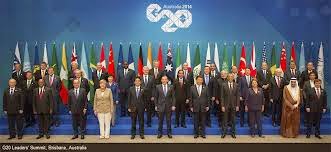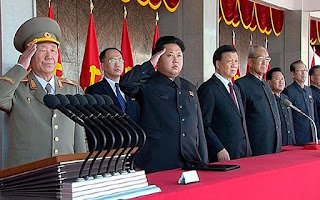The Global Climate Change Initiative: The Green Climate Fund ... Part 1 of 2
The
Global Climate Change Initiative: The Green Climate Fund
Part
1
By.
E. Stanley Ukeni
The 2014 edition of the G-20 summit in Brisbane
Australia ended spectacularly—with all of its pump and circumstance. On its final day, as traditional, the Leaders
of the G-20 Top Economies of the world lined up for a closing Press Conference.
Why spectacularly...you may be wondering. Well, it’s because of a rather
unexpected announcement by the United States and Japanese government’s to
support the global climate change initiative with a significant financial
support to the Green Climate Fund.
One of the takeaways, for Africa, from the annual
meeting of the G-20 Heads of State is the remark by the US President on Climate
Change funding. As part of his press conference briefing, US President Obama
said, “The US$3 billion contribution to the Green Climate Fund that I announced
yesterday will help developing nations deal with climate change, reduce their
carbon pollution and invest in clean energy…”
This contribution by the United Stated of America,
and the equally announced US$1.5 billion pledge to the Green Climate Fund by
the Japanese Prime Minister Abe, is a very positive development for Africa, as
the continent is projected by The World Bank to being one of the worst affected
regions from Climate Change—with many of the African countries struggling with
meager financial means to mitigate against the emerging threat it would pose to
their economies and livelihoods of their citizens. The latest announcements by
the United States and Japan are in addition to the US$2.3 billion pledge by
eight countries when the Fund was initially established in 2010, during the
United Nations Climate Change Conference in Cancun, Mexico.
The Green Climate Fund (GCF) is a fund established
within the framework of the United Nations Framework Convention on Climate
Change (UNFCCC)—an international environmental treaty. It was established as a
mechanism through which money can be effectively redistributed from the
developed countries to the developing nations of the world, as a means of helping
the developing countries to more efficiently reduce their vulnerability to the
economic, social and biological effects of Climate Change. The Fund is also
intended to be used to encourage practices that would curtail the emissions of
greenhouse gases, and/or enhance the removal of the gases from the atmosphere. The
GCF aims to achieve its objectives by supporting projects, programs, policies
and other environmentally friendly initiatives in developing countries using
thematic funding window. The GCF is headquartered in the new Songdo district of
Incheon, South Korea.
The recent pledge by the United States and Japan
means that GCF now has a total fund capitalization of US$7.5 billion so far
from thirteen different donor nations. It is expected that some developed
nations that has not already committed to funding the UN-backed GCF will do so
at a two-day pledging session in Berlin this week. The Executive Director of
GCF, Héla Cheikhrouhou, has hailed the recent pledges as “game changing”. She
reiterated President Obama’s assertion that “no nation is immune, and every
nation has a responsibility to do its part” to help alleviate to effects of
climate change.
By E. Stanley Ukeni, ©2015. All Rights Reserved.





Comments
Post a Comment